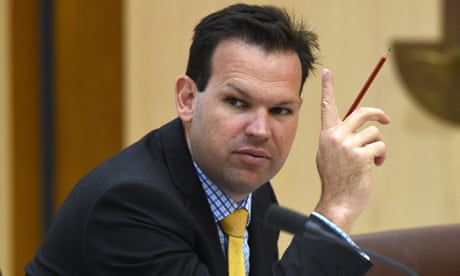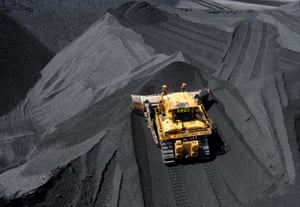Extract from The Guardian
Lenore Taylor
Australia cannot hail the Paris accord as a turning point and simultaneously rejoice in a great long-term economic future for coalA Climate Analytics report has found that developed countries will have to stop burning coal for electricity by 2030. Photograph: Dave Hunt/AAP
Contact author
@lenoretaylor
Saturday 19 November 2016 09.12 AEDT
When Malcolm Turnbull was dumped by the Liberal party in 2009 because he refused to renounce support for emissions trading, the man now about to assume responsibility for implementing Donald Trump’s evisceration of US climate change policy was elated.
Myron Ebell, a veteran warrior against action on global warming, wrote on his “competitive enterprise institute” blog that “toppling Turnbull was a necessary step” in defeating Australia’s cap and trade scheme. And he understood exactly who deserved credit.
“A number of Liberal members have risked their careers to stop cap-and-trade, including Cory Bernardi and Nick Minchin as well as Tony Abbott. They should all be honored for their courageous stand,” Ebell enthused.
Trump, who has claimed the “concept” of global warming was concocted by the Chinese to hurt American manufacturing, has vowed to withdraw from the Paris climate change treaty, abolish the Environment Protection Authority’s climate policy role, scrap Barack Obama’s centrepiece Clean Power Plan and dismantle any curbs on fossil fuel developments.
Trump’s transition to government website says: “We will streamline the permitting process for all energy projects, including the billions of dollars in projects held up by President Obama, and rescind the job-destroying executive actions under his Administration. We will end the war on coal, and rescind the coal mining lease moratorium ... and conduct a top-down review of all anti-coal regulations issued by the Obama Administration.”
Ebell, whose organisation has had financial links to the coal industry, is widely reported to be in charge of that transition at the EPA.
Little wonder that his “honored” friends in Australia are elated.
Abbott declared Trump’s election would “put climate change into a better perspective” and diminish the “moral panic” about global warming. Presumably the better perspective is one where we don’t do very much about it, and the “morality” not worth panicking about is the idea that we should not leave our children a world experiencing dangerous and irreversible change.
And since the Liberal party dumped Turnbull the first time, some new conservatives have arrived who would also probably earn Ebell’s praise.

One of them is the man Turnbull has now appointed as resources minister, the Liberal National party senator Matt Canavan.
From the moment he took up the portfolio, Canavan has talked up the “uncertainties” of climate science.
And soon after Trump’s election, Canavan was hailing it as a budgetary boon for Australia, in part because coal mining would be able to continue unconstrained.
“Donald Trump is good for fossil fuels, good for steel and good for Australia,” he told the Australian.“President-elect Trump was very clear in his support for the coal mining sector, whereas President Obama had taken steps to restrict expansion of the coal industry,’’ he said.
“The newly elected president has said he’ll rescind those regulations and that’s having an effect on world markets.”
But at exactly the same time, Turnbull was announcing that Australia would go ahead and ratify the Paris agreement, despite some of his own backbenchers declaring that Trump’s victory had rendered the deal “cactus”.
The Paris pact, Turnbull declared, was “a watershed and a turning point”.
Problem is, it’s only a turning point and a watershed if nations do what they promised – that is, constrain global warming to “well below 2C”, which requires them not only to meet the greenhouse emissions reductions already pledged but also to increase them over time to actually meet that aim.
And that requires the phasing out, over time, of coal.
The latest world energy outlook from the conservative International Energy Agency shows that under the scenario necessary to meet the existing Paris targets (still not enough to limit warming to 2C), fossil fuels decline from 67% of the energy mix to 24%, and 16% of that 24% is carbon capture and storage, the viability of which remains uncertain.
A Climate Analytics report has found that developed countries will have to stop burning coal for electricity by 2030, China by 2040 and the rest of the world by mid-century in order to meet commitments made in Paris.
To underline the obvious, we really cannot simultaneously hail the Paris agreement as a turning point and rejoice in a glorious long-term economic future for the coal industry. Except that is exactly what the Turnbull government is doing.
There are many difficult choices facing Australia as a Trump administration upends the existing world order.
And the Turnbull government was already stretching credulity with its insistence that it could meet the Paris targets, despite the emissions reduction fund probably running out of money next year and its suggestion that a looming policy review won’t impose any new requirements on industry.
But, as in so many other ways, the ascent of Trump is polarising things, forcing a choice between the agenda of Ebell and Abbott, and the ever more urgent efforts to do something about global warming. We cannot keep pretending.
Back when Ebell celebrated his ousting, we knew where Turnbull stood. He wouldn’t lead a party that wasn’t as committed to action on global warming as he was. Now he does, but those who overthrew him believe that despite his return to the leadership, they have him tamed. Time is running out for him to prove otherwise. And Trump’s radical reverse gear on climate makes it even harder for his government to continue its obfuscation.

No comments:
Post a Comment